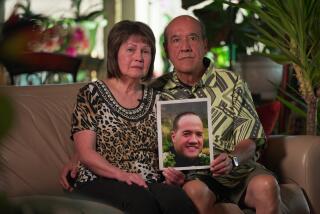Doctors’ Liability for Patients’ Accidents at Stake in Lawsuit
- Share via
A potentially far-reaching lawsuit that asks just how accountable a doctor should be when an epileptic patient gets behind the wheel of a car is set to close today in El Cajon Superior Court with the last of the lawyers’ final arguments.
The suit stems from a head-on, two-car crash in August, 1983, on Coronado’s Silver Strand Boulevard. An 18-year-old epileptic, Trudy Stevenson, lost control of her 1977 Mustang and ripped across the median into oncoming traffic, killing a 90-year-old retired Navy captain and injuring three people.
The key factual question for the jury, which is expected to get the case late today, is whether Stevenson suffered an epileptic seizure that led to the accident.
The underlying issue, however, is whether her East County neurologist, Mark C. Levine, is liable for damages to Stevenson’s passenger and friend, Sherril Altstadt, whose spinal cord was cut in the crash, leaving her a paraplegic. She frequently attended the six weeks of trial in her wheelchair.
Closely Watched Case
Doctors and lawyers who specialize in medical malpractice issues have watched the case closely. If the jury returns a verdict against Levine, physicians fear a flood of expensive cases and a greatly diminished incentive to assist epileptics--and those with other disorders that may lead to blackouts, such as heart disease and alcoholism--gain a driver’s license.
Doctors are required under state law to report immediately to county health officers all disorders involving “lapses of consciousness.” That information must be passed on to the Department of Motor Vehicles, the law says.
Under that law, a verdict against Levine would mean “epileptics and others in a similar class will not be able to drive, period,” said Robert W. Harrison, Levine’s San Diego lawyer. “Because (doctors) are going to report them all as unsafe, to cover their rear ends, or they’ll refuse to see that class of patients.”
Altstadt’s attorney, Patrick Frega of San Diego, said the case has already had an impact. Since trial began in late August, he said: “The doctors have been reporting everything, even things they don’t need to.”
‘Economic Oath That Matters’
“I would think the Hippocratic oath would have some impact,” Frega said. “But I think it’s the economic oath that matters, that (doctors) are going to get hurt in their pocketbooks.”
The case was filed in August, 1984, and in El Cajon because Altstadt, then known by her maiden name, Sherril Romero, used to live in nearby Santee. She sued both Levine and Stevenson, alleging negligence.
The DMV issued Stevenson a probationary license in April, 1981, with conditions that required her to report “adverse changes” in her condition. That license was issued after a report Levine filed in March, 1981.
On Jan. 12, 1983, Stevenson was hospitalized with recurring seizures. In arguments Thursday, Frega contended she had at least 12 that day alone.
Levine, Frega said, was required to report that “adverse change” by Jan. 25, or 10 days after Stevenson was released from the hospital, but failed to do so. That June, Levine told Stevenson she could drive, but only in emergencies or to work, Frega said.
The accident occurred Aug. 28, two months after that.
Frega, who planned to resume arguments today, said he intends to ask the jury to award $4.7 million in damages to Altstadt, who now lives in Newbury Park, a Ventura County suburb of Los Angeles. Now 25, she said Thursday that she is studying to become an interpreter for the deaf.
Harrison, who will follow Frega to the lectern, said he plans to tell the jury that the accident was not caused by a seizure. Further, Stevenson “never lost consciousness” during any seizure, so the law--which applies to “lapses of consciousness”--did not apply directly, he said.
As for the January, 1983, seizures, they were not any worse than any that had come before but only more frequent, so not an “adverse change,” Harrison said.
Most importantly, Harrison said, Levine faithfully followed all reporting requirements. “I don’t believe there’s any evidence that holds water as to negligence,” Harrison said.
Altstadt has settled her claims against Stevenson, said Stevenson’s attorney, Jim Badger.
More to Read
Sign up for Essential California
The most important California stories and recommendations in your inbox every morning.
You may occasionally receive promotional content from the Los Angeles Times.













